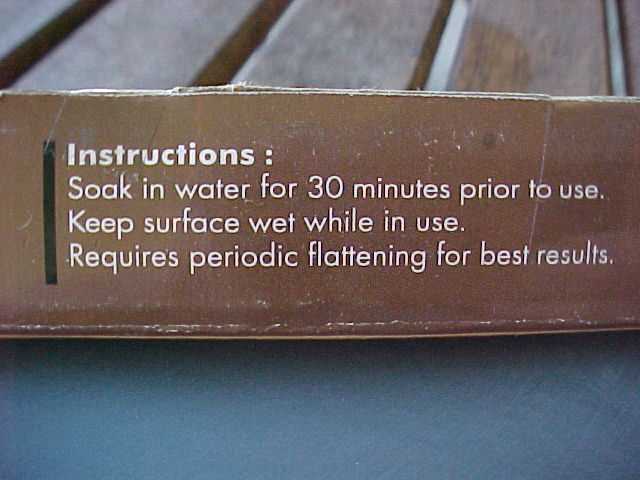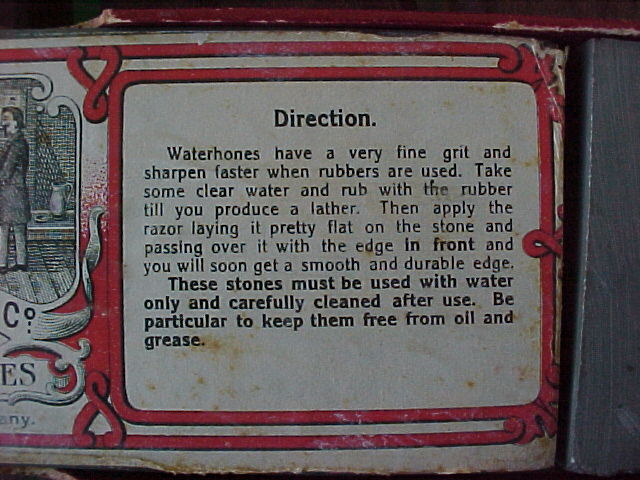Results 1 to 10 of 12
Thread: Can i use oil on a water stone?
-
10-06-2015, 03:25 PM #1Senior Member

- Join Date
- Oct 2013
- Location
- Norway
- Posts
- 258
Thanked: 22 Can i use oil on a water stone?
Can i use oil on a water stone?
Hi,
As the title "says":
Can i use oil on water stones for honing? (yes or no - explain please)
Can the oil use destroy the water stone? (yes or no - explain please)
I hope some here can help me with these questions.
Thanks in advance.
See you,
Flávio.Are you stressed???!!! Get out and go fishing!!!
Get out and go fishing!!! 
-
10-06-2015, 03:29 PM #2

Coticules, Charnley, Arkansas are alright with water or with oil. Thuringans, Escher, Hohenzollern, are not to be used with oil. Depends on the composition of the stone. In general I think synthetic waterstones should not be used with oil.
Be careful how you treat people on your way up, you may meet them again on your way back down.
-
The Following User Says Thank You to JimmyHAD For This Useful Post:
cariocarj01 (10-06-2015)
-
10-07-2015, 09:32 AM #3Senior Member

- Join Date
- Oct 2013
- Location
- Norway
- Posts
- 258
Thanked: 22
I'm questioning this because in another forum I participate suddenly came this question and a member posted a video on YouTube from a Brazilian man talking about stones for honing and this man on YouTube video tell that every stone can be use with oil, vaseline or water. He says that it doesn't matter what kind stone we have, we decide if we will use water, oil or vaseline.
Is he right?Last edited by cariocarj01; 10-07-2015 at 09:35 AM.
Are you stressed???!!! Get out and go fishing!!!
Get out and go fishing!!! 
-
10-07-2015, 09:53 AM #4

I think you can, with a rather important caveat that once you use some of these stones with oil (particularly certain natural porous stones) they basically become oilstones.. i.e. there's no going back to water, or it wouldn't be very easy, since the stone will soak up the oil and then it would be very hard to degrease it. I can only assume that it wouldn't hold water on the surface and so... you get the obvious problem with that. I never tried it myself with a porous waterstone. I did use both oil and water on my Yellow lake and that worked just fine, because the stone can be washed and doesn't soak up much of the oil (lapping takes care of the oily surface as well).
Now, why would you use oil on a synthetic stone anyway? Seems to me that it isn't beneficial and it would get messy for no good reason.As the time passes, so we learn.
-
The Following User Says Thank You to Srdjan For This Useful Post:
cariocarj01 (10-07-2015)
-
10-07-2015, 01:30 PM #5

I don't know to which stones he is referring. we read all sorts of statements on the Internet. I do know that all of the 'experts', all of the relevant literature on the topic, that I'm aware of say that you'll ruin many types of waterstones if you use oil. Vaseline is a petroleum based product, and IMHO too thick to be of use on a stone. They are called water stones for a reason. As are those known as oil stones. Below see instructions for the Chinese '12k', and for a yellow/green Escher ;


Last edited by JimmyHAD; 10-07-2015 at 01:33 PM.
Be careful how you treat people on your way up, you may meet them again on your way back down.
-
The Following User Says Thank You to JimmyHAD For This Useful Post:
cariocarj01 (10-07-2015)
-
10-07-2015, 04:07 PM #6Senior Member



- Join Date
- Apr 2012
- Location
- Diamond Bar, CA
- Posts
- 6,553
Thanked: 3215
Are you talking about Natural Waterstones or Synthetic Waterstones?
I have used Smiths Honing Solution a water based lubricant on many Natural stone with good results and even some High Grit Water stones with mixed results. I do wash it off with Simple Green when finished honing
Oil is used on natural stones to provide a bit lubrication, suspend the swarf to keep the grit open and a bit of cushion between the stone and the razor, so just the tips of the grit are making contact for a finer finish. Stones that absorb liquids like synthetic water stones, would defeat the benefits of using oil.
I have also removed oil from many natural stone, by soaking with degreaser and heat, it is a pain in the butt and can take many months to completely remove all the oil and smell.
So could you use oil, maybe… but why would you want to, if there are other alternatives?
-
The Following User Says Thank You to Euclid440 For This Useful Post:
cariocarj01 (10-07-2015)
-
10-07-2015, 05:58 PM #7Senior Member

- Join Date
- Oct 2013
- Location
- Norway
- Posts
- 258
Thanked: 22
Last edited by cariocarj01; 10-07-2015 at 06:23 PM.
Are you stressed???!!! Get out and go fishing!!!
Get out and go fishing!!! 
-
The Following User Says Thank You to cariocarj01 For This Useful Post:
Srdjan (10-07-2015)
-
10-07-2015, 06:14 PM #8Senior Member



- Join Date
- Apr 2012
- Location
- Diamond Bar, CA
- Posts
- 6,553
Thanked: 3215
Probably the same guy who hones on bricks, yea it can be done, but… YMMV…
-
The Following User Says Thank You to Euclid440 For This Useful Post:
cariocarj01 (10-07-2015)
-
10-07-2015, 06:30 PM #9

I remember reading, back in the 1970s, that oil stones, such as Arkansas, India, what have you, lasted longer than the softer waterstones. The softer stones would wear more quickly. A book written in the 1800s that examined stones based on their geographical place of origin characterized the Belgian Coticule, which can be used with oil or water, as too soft for tools, chisels, plane blades, but ideal for razors.
So a guy could say, I sharpen my chisels on coticules all the time ........ you can do it. But why would you want to ? Sure, you can do it, but you'll just wear the stone out prematurely. If Escher says 'avoid contact with oil or grease' ...... I'm not going to test it to see if I could hone on it with oil without ruining the stone. Water is cheap. Stones are not. Anyway, whatever works. That is how we got the wheel, people trying different things.Be careful how you treat people on your way up, you may meet them again on your way back down.
-
The Following User Says Thank You to JimmyHAD For This Useful Post:
cariocarj01 (10-07-2015)
-
10-09-2015, 09:19 AM #10Senior Member

- Join Date
- Oct 2013
- Location
- Norway
- Posts
- 258
Thanked: 22


 19Likes
19Likes LinkBack URL
LinkBack URL About LinkBacks
About LinkBacks






 Reply With Quote
Reply With Quote


